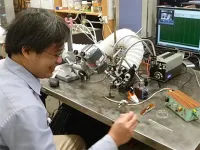(Press-News.org) A new study finds that radiation therapy (RT) suppresses a key protein called bone morphogenetic protein and activin membrane-bound inhibitor (BAMBI) and activates immune suppressive cells. These effects dampen the capacity of cancer-fighting immune cells and decrease the effectiveness of radiation, inducing therapy resistance in cancer patients, according to a paper published December 15, 2023 in the Journal of Clinical Investigation.
Radiation therapy is a common cancer treatment that kills cancer cells and activates immune cells to fight cancer. Yet this process also recruits immunosuppressive cells like myeloid-derived suppressor cells (MDSCs), limiting the effectiveness of radiation therapy.
TGF-β in radiotherapy resistance
Researchers at the University of Chicago Medicine Comprehensive Cancer Center conducted a study to understand the mechanisms underlying MDSC-induced therapy resistance. MDSCs secrete a variety of immunosuppressors in response to RT. One such secreted protein, known as transforming growth factor-beta (TGF-β), plays a critical role in tumor progression. Thus, the researchers thought targeting TGF-β could be a therapeutically beneficial approach in radiation therapy-resistant patients.
“Although TGF-β is known to have an established role in immune suppression and migration of MDSCs, it is globally expressed. So, drugs that directly target TGF-β may induce unwanted side effects. Thus it is critical to understand the mechanisms that regulate the TGF-β signaling in MDSCs so we can target TGF-β indirectly and have better radiation treatment outcomes,” said Ralph Weichselbaum, MD, Daniel K. Ludwig Distinguished Service Professor and Chair of Radiation and Cellular Oncology at UChicago Medicine.
Radiation reduces BAMBI levels
BAMBI is a mock receptor, or pseudoreceptor, that mimics the TGF-β receptor. It is known to suppress TGF-β signaling and is implicated in tumor suppression.
The research team, led by Liangliang Wang, PhD, a Research Assistant Professor in the Weichselbaum laboratory, analyzed the transcriptome data of cancer patients and found that patients with higher BAMBI expression showed prolonged overall survival in four tumor types: kidney renal clear cell carcinoma; kidney renal papillary cell carcinoma; pheochromocytoma and paraganglioma; and uterine corpus endometrial carcinoma.
Moreover, BAMBI was highly expressed in immune cells like monocytes and macrophages compared to other cell populations in melanoma and colorectal cancer patients.
BAMBI improves survival rate
“It is remarkable to see a significant reduction of BAMBI levels only in tumor-infiltrating MDSCs, not in other immune or tumor cell types following radiation treatment,” said Weichselbaum. “We were interested in understanding the mechanism underlying the radiation-induced reduction of BAMBI levels in MDSCs.”
Weichselbaum’s team, in collaboration with Chuan He, PhD, the John T. Wilson Distinguished Service Professor of Chemistry at UChicago, previously published a study in Cancer Cell demonstrating increased levels of a protein known as YTH N6-methyladenosine RNA-binding protein F2 (YTHDF2) in MDSCs following radiation.
“In the current study, we were able to reproduce the similar kind of results in another cohort of patient samples. Moreover, we observed a close interaction between YTHDF2 and BAMBI in tumor-infiltrating immune cells, indicating YTHDF2 might be playing a critical role in regulating BAMBI’s expression,” said Weichselbaum.
The team conducted animal studies to test if overexpressing BAMBI in MDSCs could suppress the tumor infiltration of MDSCs in mice treated with radiation. As expected, viral delivery of BAMBI significantly reduced tumor growth and increased survival. Interestingly, BAMBI overexpression also further improved the outcomes of immunotherapy in the irradiated mice.
Many pharmacological interventions targeting TGF-β exist. Because many have toxic and non-specific effects, novel therapies like BAMBI – that indirectly target TGF-β and are restricted to immune suppressor cells – are especially promising, as they not only control local tumor growth but may also prevent the cancer from spreading.
The study, “Epitranscriptional regulation of TGF-β pseudoreceptor BAMBI by m6 A/YTHDF2 drives extrinsic radioresistance,” was published in in Journal of Clinical Investigation on December 15, 2023, and funded by the Chicago Tumor Institute, an endowment from the Ludwig Cancer Research Foundation, and a National Institutes of Health R01 grant.
Additional authors include Xianbin Yu, Xiaoyang Dou, Jason Bugno, Kaiting Yang, Chuangyu Wen, Linda Zhang, Dapeng Chen, Xiaona Huang, Jiaai Wang, Ainhoa Arina, Sean Pitroda, Steven J. Chmura, and Hua Laura Liang from the University of Chicago; András Piffkó from the University of Chicago and University Medical Center Hamburg-Eppendorf, Hamburg, Germany; Wei Si from the Institute of Animal Sciences of the Chinese Academy of Agricultural Sciences, Beijing, China; and Xingchen Ding from the Shandong First Medical University and Shandong Academy of Medical Sciences, Jinan, China.
END
Novel therapeutic target overcomes resistance to radiation therapy
2023-12-15
ELSE PRESS RELEASES FROM THIS DATE:
Understanding atmospheric flash droughts in the Caribbean
2023-12-15
The word “drought” typically conjures images of parched soil, dust-swept prairies, depleted reservoirs, and dry creek beds, all the result of weeks or seasons of persistently dry atmospheric conditions.
In the sun-soaked islands in the Caribbean, however, drought conditions can occur much more rapidly, with warning signs appearing too late for mediation strategies to limit agriculture losses or prevent stresses on infrastructure systems that provide clean water to communities.
Such occurrences – known as flash droughts – are the focus of a new paper authored by Assistant Professor Craig Ramseyer of the College of Natural Resources ...
Pesticides and adjuvants disrupt honey bee’s sense of smell
2023-12-15
It has long been known that exposure to pesticide sprays is harmful to honey bees. In a new study, researchers have uncovered the effect of such sprays on the sense of smell in bees, which could disrupt their social signals.
Honey bees live in dynamic communities and constantly communicate with each other using chemicals that serve as social cues. For example, nurse bees—that are responsible for taking care of larvae that ultimately become queens and worker bees—constantly monitor the ...
Immune cells shape lung before birth and provide new avenues for treating respiratory diseases
2023-12-15
Immune cells play an active and intimate role in directing the growth of human lung tissue during development, researchers find, revolutionising our understanding of early lung development and the role of immune cells outside of immunity.
The research offers new insights for understanding and treating respiratory conditions, such as chronic obstructive pulmonary disease (COPD). Respiratory conditions account for almost 20 per cent of all deaths in children under five years worldwide1.
The work reveals a surprising coordination between the immune and respiratory systems, much earlier in development than previously thought. This discovery raises questions about the ...
Rembrandt broke new ground with lead-based impregnation of canvas for The Night Watch
2023-12-15
New research has revealed that Rembrandt impregnated the canvas for his famous 1642 militia painting ‘The Night Watch’ with a lead-containing substance even before applying the first ground layer. Such lead-based impregnation has never before been observed with Rembrandt or his contemporaries. The discovery, published today in Science Advances, underlines Rembrandt's inventive way of working, in which he did not shy away from using new techniques.
The surprising observation is yet another result from Operation Night Watch, the largest and most wide-ranging research and conservation project in the history ...
SFU and UBC researchers receive $1.25 million to study cumulative effects on B.C. salmon
2023-12-15
Salmon researchers from British Columbia are embarking on a three-year study to understand and help mitigate the cumulative threats affecting the vulnerable species in the province’s watersheds.
The Watershed Futures Initiative, which includes researchers from Simon Fraser University, University of British Columbia and University of Montana, has received $1.25 million from the federal and provincial governments – through the joint British Columbia Salmon Restoration and Innovation Fund – to tackle the combined impacts of logging, mining, urban development, agriculture, climate change and other factors on salmon.
While ...
Endocrine-disrupting chemicals found in menstrual products including tampons, pads, and liners
2023-12-15
The average menstruator will use over 11,000 tampons or sanitary pads in their lifetime. Vaginal and vulvar tissue that touch pads and tampons is highly permeable. Through this permeable tissue chemicals are absorbed without being metabolized, which makes endocrine-disrupting chemicals potentially dangerous when found in menstrual products. Endocrine-disrupting chemicals can interfere with human hormones and cause medical issues, including gynecological conditions such as endometriosis and uterine fibroids.
Joanna Marroquin, a Mason PhD in Public Health student, and Associate ...
Five researchers named Argonne Distinguished Fellows for 2023
2023-12-15
The U.S. Department of Energy’s (DOE) Argonne National Laboratory has named five highly accomplished scientists as Argonne Distinguished Fellows in 2023. They are Glenn Decker, Paul Fenter, Robert Fischetti, Sven Leyffer and Valentine Novosad.
The honor recognizes scientists who have not only achieved international esteem but who have also demonstrated exceptional achievements in science or engineering relevant to Argonne’s core missions. They are leaders of major, complex, high-priority projects or programs that have an impact on the future of the Laboratory. Only a small ...
Study shows exposure to household chemicals can lower odds of getting pregnant
2023-12-15
Exposure to phthalates, a group of plasticizing and solvent chemicals found in many household products, was linked to a lower probability of getting pregnant, but not to pregnancy loss, according to research by a University of Massachusetts Amherst environmental and reproductive epidemiologist.
The study, published this week in the journal Environmental Health Perspectives, also noted an association between preconception exposure to phthalates and changes in women’s reproductive hormones, as well as increased inflammation and oxidative stress.
“Phthalates ...
NRL’s Debra Rolison elected 2023 National Academy of Inventors Fellow
2023-12-15
WASHINGTON – Debra Rolison, Ph.D., of the U.S. Naval Research Laboratory (NRL) has been named Fellow of the National Academy of Inventors (NAI), for having demonstrated a highly prolific spirit of innovation in creating and facilitating outstanding inventions that have made a tangible impact on the quality of life, economic development, and welfare of society.
Rolison has been at the lab for over 43 years and heads the Advanced Electrochemical Materials section. The recognition by the NAI is attributed to the efforts made by her team’s inventions related to a new form factor for zinc anodes in rechargeable ...
North America’s first people may have arrived by sea ice highway
2023-12-15
SAN FRANCISCO — One of the hottest debates in archeology is how and when humans first arrived in North America. Archaeologists have traditionally argued that people walked through an ice-free corridor that briefly opened between ice sheets an estimated 13,000 years ago.
But a growing number of archeological and genetic finds — including human footprints in New Mexico dated to around 23,000 years old — suggests that people made their way onto the continent much earlier. These early Americans likely traveled along the Pacific coastline from Beringia, the land bridge between Asia and North America ...




